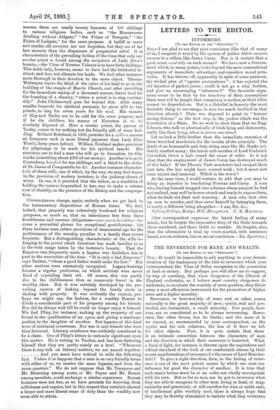LETTERS TO THE EDITOR.
INFORMERS.
[To THE EDITOR OF THE " SPECTATOR:1 SIR,—I am glad to see that your conscience (like that of many of us, I suspect) is vexed by the system of justice which secures success to a villain like James Carey. But is it certain that a good cause must rely on such means ? We have now a Govern- ment which, in many points, looks beyond the mere conventional arguments of immediate advantage, and considers moral prin- ciples. It has thrown off, apparently in spite of some pressure, the wicked plan of "agents provocateurs " ; it has rejected the old injustice of packed juries ; could it not go a step further, and give up encouraging "informers P" The favourite argu- ment seems to be that by the treachery of their accomplices these men will be taught that conspiracy is useless, as their allies cannot be depended on. But is a disbelief in honesty the most desirable thing to encourage, in men too much inclined in that direction already ? Plato was disposed to point to "honour among thieves" as the first step to the justice which was the foundation of a State. Do we wish to show them that we Eng- lishmen, who talk so pharisaically of Irish lying and dishonesty, really like their lying, when it serves our turn ?
Let us look a little further than the immediate execution of these wretched murderers, for the results of the principle. The death of an honourable and duty-doing man like Mr. Burke evi- dently startled many ; the heroic self-sacrifice of Lord Frederick Cavendish threw a halo round the cause of order. Is it not clear that the employment of James Carey has destroyed much of this halo ? If the Phaenix Park murderers had escaped their just fate, the law might have seemed weak ; but it must now seem unjust and immoral. Which is the worst ?
At the same time, I would venture to add that you may be doing an injustice in bracketing Norman and Carey. A man who, finding himself dragged into schemes whose purport he had not realised, may well be horror-struck and ready to expose them, when he finds out their real meaning. A man who first stirs up men to murder, and then saves himself by betraying them, is surely a different being altogether.—I am, Sir, &c., Sydney Cottage, Roslyn Hill, Hampstead. C. E. Ifsuitics.
[Our correspondent expresses the latent feeling of many minds, but he forgets the imperative duty of the State towards those murdered, and those liable to murder. He forgets, also, that the alternative is trial by court-martial, with sentences based, not on evidence, but on moral conviction.—En. Spectator.]


































 Previous page
Previous page